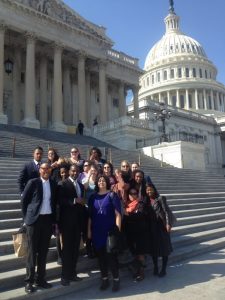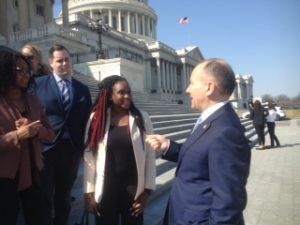social work
Teaching Political Advocacy on Capitol Hill
In this post, we revisit an elective course introduced in the first post of this blog series focused on teaching during the Trump presidency. As previously described, the social work elective is centered on the social welfare and human rights implications of the first 100 days of the presidency. To say the least, it’s been a fast-paced course that has challenged my students and I to really pay attention to national politics and how such policies impact our country’s most vulnerable individuals at the local level. This post will highlight an experiential learning opportunity at the US Capitol.
On March 9, 2017, students boarded a chartered bus to Washington, DC to participate in the 3rd annual Social Work Students Advocacy Day on the Hill organized by the Congressional Research Institute for Social Work and Policy (CRISP). The event provided an opportunity for students to meet with Congressional members and their staff to advocate on federal legislation critical to social workers and the populations they serve. For all the students, this was their first time advocating on Capitol Hill. To prepare, we spent time in class beforehand discussing what to expect and the students also watched an on-line tutorial developed by CRISP. As suggested by CRISP, students lobbied for the passage of H.R. 1290: Improving Access to Mental Health Act and H.R. 1289: The Dorothy I. Height and Whitney M. Young, Jr. Social Work Reinvestment Act. The students also lobbied against the passage of H.R. 610, which includes the Choices in Education Act of 2017 and No Hungry Kids Act.
Students also engaged in advocacy related to policies important to them. For example, students used personal stories to advocate for the prevention of the repeal and replacement of the Affordable Care Act (ACA) and “defunding” Planned Parenthood. Students were able to articulate how the ACA was an important social welfare policy that protected many citizen’s right to healthcare and other vital behavioral health services. Students also discussed how maintaining women’s rights to accessible healthcare was related to the services provided by Planned Parenthood. As the day went on, the students became more confident in their abilities to communicate with elected officials and their staff with some students even seeking out additional meetings on their own.
Participating in Advocacy Day was an important opportunity for my students to recognize that even at the federal level, politicians are just fellow citizens, who work for us. Students expressed this realization both during a debrief of the experience on the bus ride home and in class the next week. One student stated “that’s just what I needed to do” in regard to engaging in the political process. Some students even expressed their own political ambitions and participated in a mini-seminar focused on social workers running for office.
As educators, we must help students understand that while politicians have become “celebrities” they are not untouchable, meaning we have the right and duty to reach out to our elected officials and share our thoughts on how we want them to vote on policies important to us as citizens and professionals. It is our responsibility, as those teaching about human rights, to also teach our students they play a role in advocating for policies that work toward human rights for all.
Photos taken by the author in Washington, DC on March 9, 2017.
Christina M. Chiarelli-Helminiak

